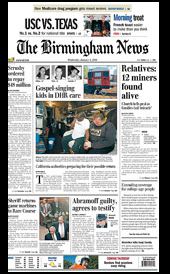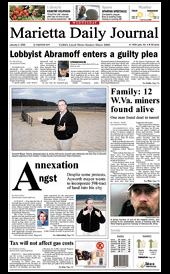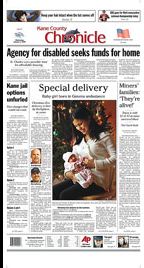Mine disaster
Much already had been written about how newspapers were caught with woefully wrong headlines about the West Virginia mine disaster in which all but one miner died, after first reports that 12 of the 13 were alive. See some excellent articles on Poynter examining the various issues. Look also at the Pittsburgh Post-Gazette's good story with audio clips.
The ramifications will be debated for months in classrooms and newsrooms. I don't pretend to have a lot of answers and so I won't carry on here except for a few brief observations:
- In this world where our credibility is declining and consumers increasingly expect instant, correct news, I wonder how understanding of deadlines, etc., consumers will be. Studies have shown that they tend to be forgiving on breaking news if the news outlet is quick to correct the information. But, again, that's often in the context of an always-on stream such as TV or the Internet. Will this just reinforce in too many people's minds that newspapers are a "dead" medium? I hope not.
- Having said that, there were warning signs that, if you read the stories closely, called for caution. The company did not immediately confirm. The word was coming from family members -- clearly secondhand. Hindsight is wonderfully clarifying, but remember those headline exercises in journalism classes: Include the qualifiers. I don't agree with Andy Barnes, now chairman at Poynter and former editor in St. Pete, when he adopts a "damn the torpedoes" stance, or as he put it: "The phrase I've always used is 'If we're going to be hung, let's be hung for sheep, not lambs.' I mean, you might as well state the full text of what you've got and if you've got it wrong, you correct it the next day."


front pages
from today shows that Birmingham, Marietta and Kane County (Ill.) were among the few that thought to use the qualifier indicating the information came from the families. Maybe it's lambish under Barnes' definition, but it's a more complete rendering of the story at that hour and, as a result, I think, readers are likely to be more understanding.

Update
The Kansas City Star's reader representative has an excellent timeline explaining what happened at that paper.
The Boston Globe used "reportedly" in its hed. Messages on the ACES message board provide some other clarifying information, including that Allentown also used the qualifier "families say."
Others did, too, I just don't have time to go through all the front pages at the Newseum. But if your publication used an atributed hed, or if you know of one that did, put it on the comments section, here.
More discussion and front pages on Testy Copy Editors.
0 Comments:
Post a Comment
<< Home